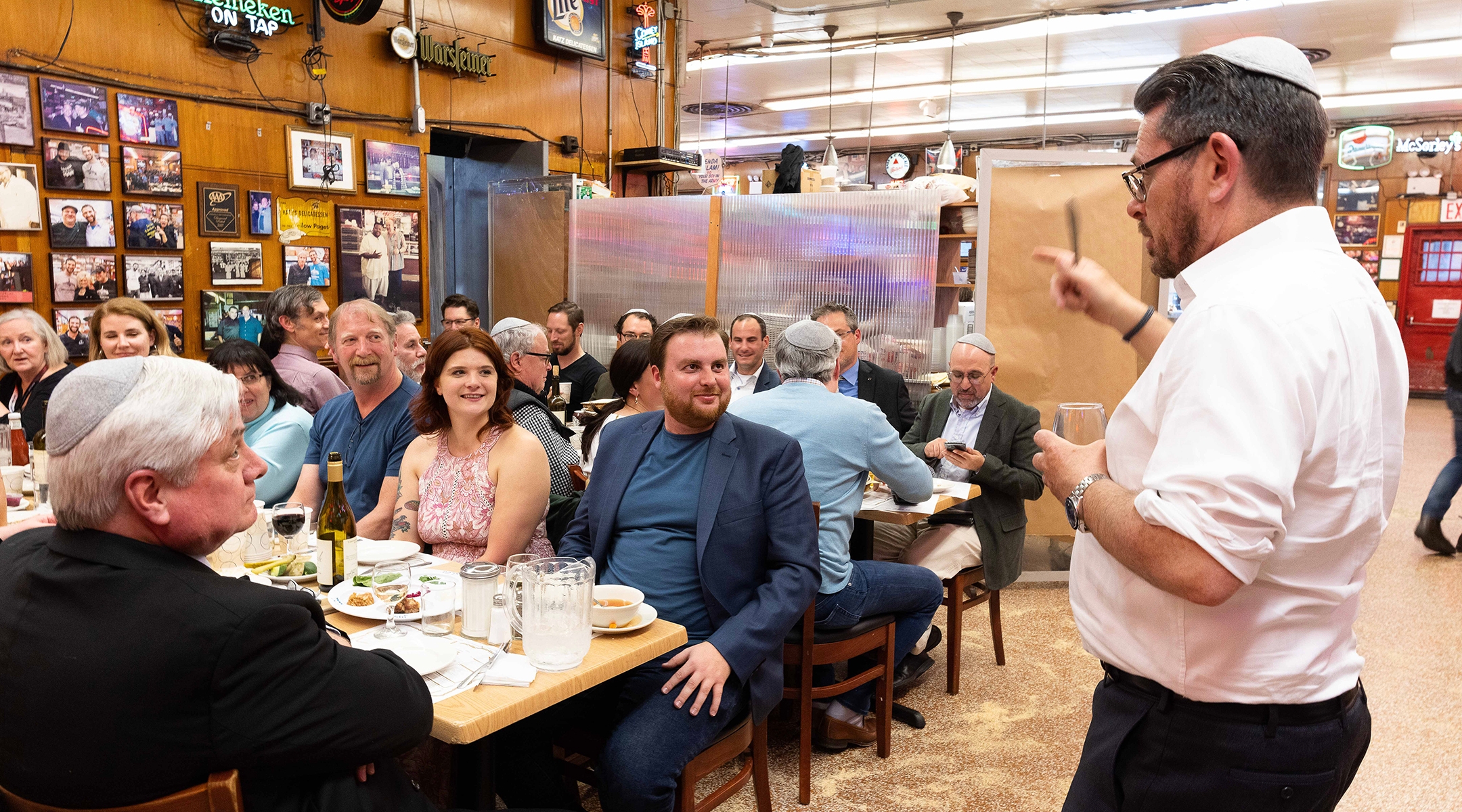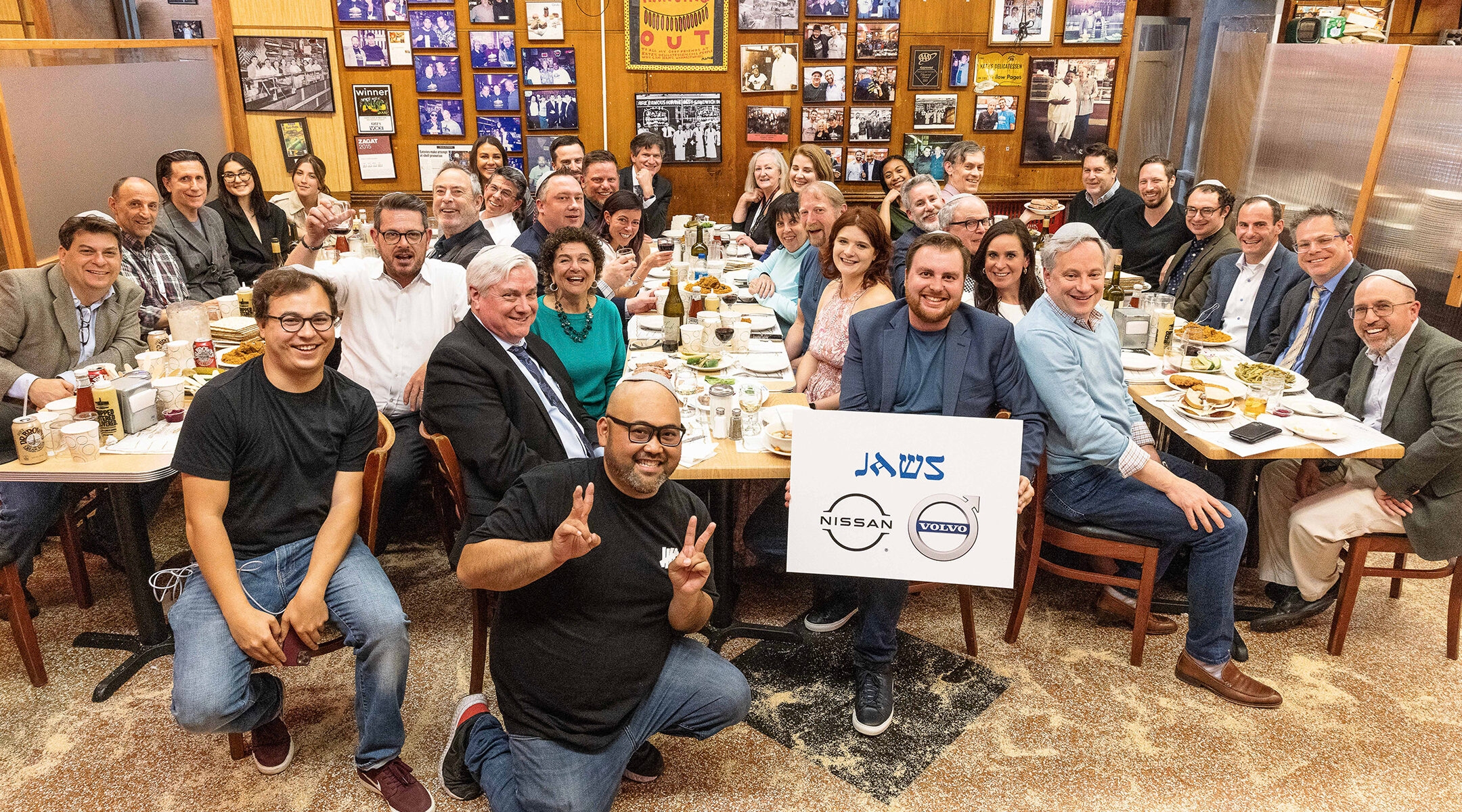(New York Jewish Week) — The idea of eating pastrami with matzah instead of rye bread may strike some as a sacrilege, but for members of the Jewish Auto Writers Society of America (JAWS), who will gather this week for a Passover seder at Katz’s Delicatessen, it’s become a tradition.
“Frankly, bread is a filler,” said Joel Feder, a senior producer for the web sites Motor Authority, The Car Connection and Green Car Reports. “You can eat more pastrami if you don’t waste space on the bread.”
Feder will lead the JAWS seder on Wednesday evening, the first night of Passover. About 30 automotive industry journalists and public relations professionals are expected to attend the gathering, which is held in a back room at the iconic Lower East Side deli. The annual event, which began in 2013, is timed for the press day at the massive New York International Auto Show at Javits Center, which opens to the public this year on Friday. A bus brings JAWS members and their guests to the deli on Houston Street.
The seder is JAWS’s big annual event, though there are efforts underway to gather in Los Angeles at the Genghis Cohen Chinese restaurant in the Fairfax section of the city during the Los Angeles Auto Show in November. The seder is sponsored by Volvo and Nissan and, yes, it has been duly noted that Passover takes place in the Hebrew month of Nisan.
“If a rabbi ever walked in, I think he’d have a heart attack,” joked the seder’s founder, Russel Datz, the national media relations manager for Volvo Car USA.
But not necessarily: Though the gathering is decidedly informal, and the food is not kosher, the JAWS seder features all the accouterments you’d expect at a seder: a seder plate, matzah, wine and a festive meal that, in addition to pastrami, includes brisket, corned beef, tzimmes and matzah ball soup.
What’s more, the group uses a haggadah written by an Orthodox rabbi. “The World’s Shortest Kosher Hagaddah” by Rabbi Yonah Bookstein of the Pico Shul in Los Angeles fulfills all the halachic (Jewish legal) requirements of the Passover seder, and it takes just 10 minutes to get from the blessing on the first cup of wine to the concluding “Next year in Jerusalem!”
The haggadah was found on the internet by Dan Passe, who worked for Nissan for 17 years and left recently to take a job as global head, communications and marketing, for the Nikola Motor Company, an electric truck manufacturer.
Passe has embraced the speedy seder concept for years and readily concedes it is an act of rebellion. “I grew up going to my grandparents in Bayside, Queens, who did a three-hour long seder where you thought you were going to pass out before you got to eat,” he said. “This haggadah, if you want to call it that, is such a great way of making [the holiday] really clear and making it very snackable, if you will.”
Bookstein, who created the 10-minute seder in 2010 for the Jewish rapper known as Kosha Dillz, was delighted that the car guys and women would be, um, speeding through his haggadah. “That’s awesome. I’m originally from Detroit so I have a soft spot for the automobile writers,” he told the New York Jewish Week.
According to its Facebook page, JAWS has 110 members. Datz started the group in 2013 as a way for Jewish industry people to gather as a community during the New York auto show, which is almost always held during the week in which Passover falls.
Feder, who hails from Plymouth, Minnesota, said he is getting grief from his mother for not being home for the holiday this year. (He’ll catch a flight Thursday morning and land in Minneapolis in time to make it to the second seder.) As this year’s seder leader, Feder is filling in for Datz and Passe, who aren’t coming to the New York auto show this year because of family commitments.

Russel Datz, right, leads the annual JAWS seder at Katz’s Deli in Manhattan in 2022. (Kevin Albinder)
In addition to the traditional wine cup left for the prophet Elijah, there will be two unoccupied seats for Datz and Passe, said Evelyn Kanter, president of the International Motor Press Association and a regular at the JAWS seder since its first year. (When Datz was informed of the empty seat gesture, he quipped: ”Is she lighting yahrzeit candles as well?”)
Kanter called the deli gathering “a beloved tradition. It’s a family of people in the automotive business who are all homeless [during the auto show].”
An Upper West Sider, Kanter grew up in Inwood, back when the nearby neighborhood of Washington Heights was known as Frankfurt-on-the-Hudson because of its large German Jewish immigrant population. After stints as an investigative consumer reporter for New York radio and TV stations, Kanter became known as the ecoXplorer, writing about travel and the environment, in addition to cars.
This year, Kanter’s daughter is in Los Angeles and her son in New York is working the night of the second seder. So, in addition to the JAWS seder, she’ll attend a virtual seder on the second night. “I’ll have dinner with my son early next week and we’ll have a delayed Passover,” Kanter said.
According to Passe, half of the seder’s participants at the deli are not Jewish. “They ask to attend because they’ve never been to a seder before,” he said. “We have people who return year after year after year who are not Jewish because they love the ceremony.”
Jenni Newman, the Chicago-based editor-in-chief of cars.com, was invited by two Jewish colleagues at her company and attended JAWS seders in 2019 and 2022. She’s planning to go to her third this week. (There were no seders during the pandemic.) Although Newman describes herself as “super active” in the Lutheran Church growing up, she considers it a gift to experience other peoples’ religions and cultures. “I really enjoyed going through the ritual with everyone and having people sitting next to me explain things,” she said. “I was kind of overcome emotionally just being part of it.”
Last year Newman “found” the afikomen, though it wasn’t much of a hunt: At the JAWS seder, the hidden piece of matzah is taped underneath a random seat. The person who finds the afikomen gets their choice of a high-end Nissan or Volvo to drive for a week after the auto show.
But the real prize goes to local JAWS members, Passe noted. “If you are local and you attend, you go home with the biggest doggy bag you can possibly imagine,” he said.
Kanter, the recipient of said doggy bags, concurs. “Leftovers at Katz’s are simply too good to waste,” she said.
The New York Jewish Week brings you the stories behind the headlines, keeping you connected to Jewish life in New York. Help sustain the reporting you trust by donating today.





